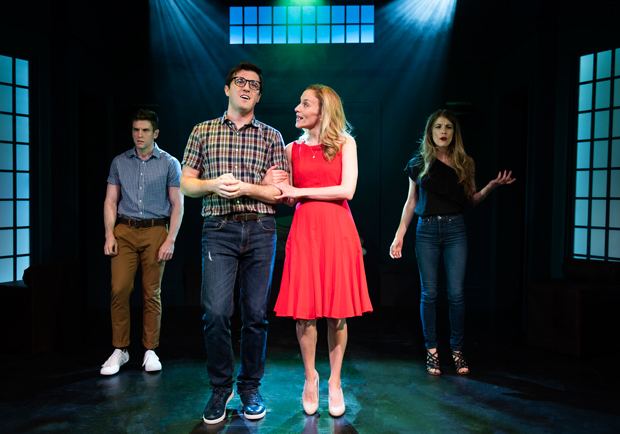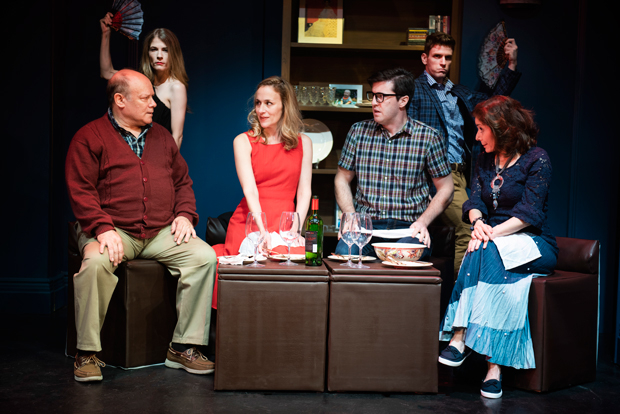Neurosis Offers Psychiatric Case Studies in Musical Form
This new show by Ben Green, Greg Edwards, and Allan Rice receives its off-Broadway premiere at DR2 Theatre.

(© Jenny Anderson)
Two neurotic people from different walks of life — one a workaholic professional, the other a minimally employed aspiring magician who still lives with his parents — randomly meet and fall in love. That's the basic plot of Neurosis, now running at the DR2 Theatre — so far, a so-standard romantic comedy. But the two lovers, Frank (Kevin Zak) and Abby (Jennifer Blood), aren't the only major characters in this new musical. So are their respective neuroses, anthropomorphized in the forms of Neurosis (Brennan Caldwell) and Neurosalina (Morgan Weed), both of whom trail after Frank and Abby like perverse Jiminy Crickets appealing to their self-sabotaging impulses. From this Inside Out-like premise, composer Ben Green, lyricist Greg Edwards, and book writer Allan Rice have fashioned a musical comedy that only half-fulfills the promise of its inventive concept.
Rice, according to a program note, earned a degree in clinical psychology at Tufts University, and at its best, real psychological insights emerge from Neurosis's whimsy. The endless self-analysis, the shying away from acting on one's innermost desires through a surfeit of overthinking — Frank's Neurosis and Abby's Neurosalina embody all of these paralyzing impulses, with Frank and Abby engaging in a constant back-and-forth with them, embracing them one instant, rejecting them the next, while never quite being able to fully cast them off. Though Frank and Abby are certainly extreme cases — Frank is saddled with a domineering mother and an ineffectual father who've screwed him up, while Abby escapes her romantic failures by plunging into her marketing job — both characters' hang-ups remain grounded in universal yearnings: principally, the desire to break away from previous damaging behavioral and emotional patterns (defying his parents and pursuing his magician career in Frank's case, falling in love with a genuinely nice man in Abby's).
Changing one's mental conditioning can be difficult, however, requiring an act of will power that can be challenging for some in the face of the comfort that comes from falling back on even the most damaging of behaviors. This is the hard truth that Neurosis isn't afraid to dramatize, giving its physicalization-of-neuroses gimmick genuine resonance.

(© Jenny Anderson)
If only Rice, Green, and Edwards had been willing to go all the way with its playful yet serious exploration of benign mental disorder. But while a braver show might have fully confronted the neuroses of its characters, Neurosis ultimately prefers its psychoanalysis neat and tidy. Perhaps it's telling that even though the musical features a therapist named Samantha (humorously played by Lacretta) who treats Frank, this particular doctor strangely doesn't do much other than offer an opening monologue setting the stage for the show to come and spend the remainder of the show treating her patient rather unprofessionally. And the show's reliance on tired Jewish stereotypes to characterize Frank and his dysfunctional family — and Abby's desire to look for a "nice Jewish boy" in contrast to all the bad boys she's previously dated — is disappointing in a show that purports to be as much psychiatric case study as musical-theater entertainment.
Purely as musical theater, though, Neurosis does have its charms. Edwards's lyrics and Rice's book are filled with quick-witted jokes and wordplay, and Green's music abounds in buoyant energy. The musical highpoint may well be the "Meet-the-Parents Tango" in Act 2, in which Abby's fateful first encounter with Frank's parents is depicted as a battle of wills for Frank's affection set to a tango beat (Shea Sullivan's choreography during this number brings additional sizzle to this tension-filled number). Though clothed by costume designer Michael McDonald in checkered shirts that make him look like an overgrown man-child, as Frank, Zak crafts a sympathetic characterization; same with Blood as the relatively more down-to-earth Abby. By contrast, Caldwell and Weed tear into their roles as Frank's and Abby's neuroses with wicked glee.
Glee is certainly in abundance in director Andy Sandberg's exuberant staging, and Neurosis may well fill one with the same feeling of delight in the moment. But though Rice, Green, and Edwards frequently gesture at psychological depths to subvert its frothy surface, this conceptually intriguing but disappointingly skin-deep show proves too committed to its crowd-pleasing ways to be both diverting and profound. Neurosis may bill itself as "a musical that gets in your head," but here's one therapy session that is bound to leave you feeling less wise about yourself than when you went in.

(© Jenny Anderson)








